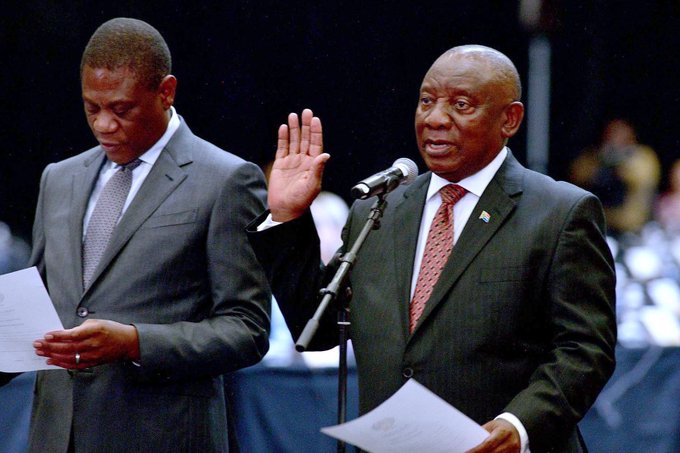South Africa’s parliament has re-elected Cyril Ramaphosa as the country’s president following a historic coalition agreement between the governing African National Congress (ANC) and opposition parties.
The new government of national unity brings together Mr. Ramaphosa’s ANC, the centre-right Democratic Alliance (DA), and smaller parties.
In his victory speech, Mr. Ramaphosa praised the new coalition and stated that voters expect the leaders to “act and work together for the good of everyone in our country.”
The agreement was reached after a day of intense political drama, with the National Assembly sitting late into the evening to confirm the new administration’s power structure.
Earlier, a deal was finalized after weeks of speculation about which party the ANC would partner with after losing its parliamentary majority for the first time in 30 years in last month’s elections.
The ANC received 40% of the vote, while the DA came in second with 22%.
ANC secretary-general Fikile Mbalula described the coalition deal as a “remarkable step.”
This agreement allows Mr. Ramaphosa, who succeeded Jacob Zuma as president and ANC leader after a fierce power struggle in 2018, to retain his position.
The next step is for Mr. Ramaphosa to allocate cabinet positions, including members of the DA.
The multi-party agreement does not include two ANC breakaway parties, which may benefit if the coalition fails to deliver the economic improvements demanded by voters.
However, opinion polls indicate that many South Africans hope this unprecedented grand coalition will succeed.
The ANC had always polled above 50% since the country’s first democratic elections in 1994, which saw Nelson Mandela become president.
However, support for the party has been dropping significantly because of anger over high levels of corruption, unemployment and crime.
Addressing South Africa’s parliament after his confirmation, Mr Ramaphosa called back to his party’s first presidential victory 30 years ago.
“We have been here before, we were here in 1994, when we sought to unite our country and to effect reconciliation – and we are here now,” he said.
An alliance between the centre-right DA and the ANC is unprecedented, considering that the two parties have been longstanding rivals for decades.
During Nelson Mandela’s leadership, the ANC spearheaded the campaign against the oppressive apartheid system and secured victory in the nation’s inaugural democratic elections.
Critics of the DA have accused the party of endeavoring to safeguard the economic advantages accrued by the country’s white minority during apartheid—a claim vehemently refuted by the party.
Addressing lawmakers late on Friday in Cape Town, John Steenhuisen, the leader of the DA, said: “Today is a historic day for our country, and I think it is the start of a new chapter.”
The National Assembly also swore in a speaker from the ANC, while the post of deputy speaker went to the DA.
Among the party leaders speaking after the agreement was reached on Friday was Julius Malema, head of the Economic Freedom Fighters – the party he founded after leaving the ANC in 2013.
He said while his party accepted “the results and the voice of the people of South Africa”, he criticised the agreement, saying: “We do not agree to this marriage of convenience, to consolidate the white monopoly power over the economy and the means of production in South Africa.”



